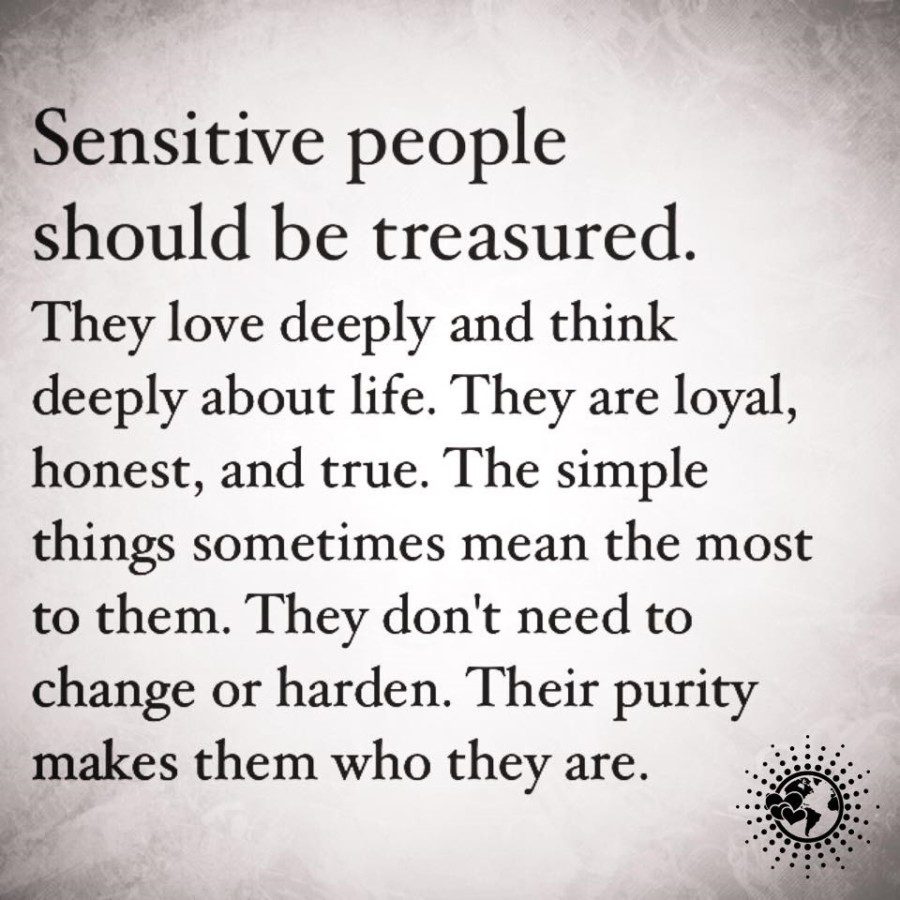Why are some folks more sensitive than others? It’s a question that’s plagued many since the dawn of time. Some people tend to wear their emotions on their sleeves, and you must tiptoe with care around those who have heightened sensitivity.
What happens if you’re one of these people with heightened sensitivity? Do others feel like they must walk on eggshells around you because you’re so sensitive. Perhaps, you take everything to heart, but you really don’t mean to do so.
Each person on this planet has a unique personality that makes them who they are, but some people have sensitivities that make life more challenging. Some experts would argue that these sensitivities make you more open to the spiritual world and give you the ability to empathize with others.
However, some would say that it’s because of your heightened sensitivities, and it can affect your life and meaningful relationships. You can breathe a sigh of relief because your emotional state is something that is formed from a combination of genetics, experience, and life, and it takes real work to control it.
Fifteen Reasons Why Some People Have Heightened Sensitivity
Many theories abound on why some people tend to be a bit more sensitive than others. Here are fifteen common reasons why these sensitivities exist.
 1. Sleep Deprivation May Stem from Heightened Sensitivity
1. Sleep Deprivation May Stem from Heightened Sensitivity
You know that you need good sleep every night, or you will be a bear the following day. However, did you know that sleep deprivation can mess with your mood, mental wellbeing, and ability to function? Did you know that sleep deprivation can set in as quickly as 11 hours without any shuteye?
Medical News Today cited a study that found that 50-70 million people in this country aren’t getting enough rest, and the lack of sleep is a real issue. Your senses, emotions, and overall feelings are all over when your body doesn’t rejuvenate through rest.
2. You’re a Human Being
If you feel a bit off and emotional today, don’t worry; you’re only human. You’re allowed to have those off days. People feel normal emotions throughout their lives, and if you’re sad, happy, mad, or exhilarated, it’s all part of living. The only time your emotional wellbeing is a concern is when it’s affecting your everyday life.
3. Trauma Can Create a Sense of Heightened Sensitivity
When a terrible event happens to you that causes trauma, it rewires your brain and causes changes within your mind. It’s not abnormal for you to feel sensations like fear, shame, sadness, anger, rage, and sorrow.
Traumas can be violent in nature, or it can be something like a car accident. However, anything that upsets your sense of normality and shakes you to the core can affect your emotions.
4. Genetic Links
What would you think if you were told that your genetics could dictate your emotional state? Many studies have been done on genetic components of emotional sensitivity, and it seems that fighting your parent’s demons may be an issue.
If one of your parents or grandparents had problems with mental illness like depression, anxiety, and personality disorders, it increases the chances that you will fight the same things.
5. You Have Sensory Processing Sensitivity
Sensory processing sensitivity is an issue that affects about 20 percent of people, per the National Library of Medicine. When you have this disorder, you see and feel things differently than most individuals. Even a loud noise like a church bell ringing, the alarm clock sounding, or a train whistle can put you on edge.
It’s not bad or wrong to be sensitive, as it’s just who you are. It may be challenging to live in a world where noise is prevalent, so learning coping skills is imperative.
6. You’re Depressed
If you feel depressed and hopeless, you’re one of more than 300 million people who feel this way. The United Nations states that it’s the leading cause of disability and illness across the globe. When you’re depressed, your emotions are not at a normal level. There are also issues with mood regulation as well as irritability.
It’s essential to get assistance when you sense the pangs of depression sweep in, as effective treatments can help.
7. There’s an Underlying Personality Disorder Causing Heightened Sensitivity
Personality disorders are commonplace these days, and they can cause significant issues with emotional regulation. People with this mental health condition often experience mood swings, hypersensitivity, anger, stress, and inappropriate emotional responses. Some of the most diagnosed personality disorders today are borderline, obsessive-compulsive, and narcissistic personality disorder, though many others exist.
 8. You Have a Poor Diet
8. You Have a Poor Diet
If you sit down to a four-course meal with mashed potatoes, steak, corn, rice, biscuits, and chocolate cake, you might not feel as good mentally as you would if you chose a salad. Everything that you ingest has a direct effect on your body, and this includes your mental health.
If you noticed that you’re feeling overly emotional these days, then do a quick inventory of what you’ve eaten. You may be surprised to find that your heightened sensitivity comes from the foods you’ve consumed.
9. You’re Dealing With Grief
Losing someone you love is a process that is impossible to understand. Many people experience heightened sensitivity from the grief they feel. Grief can be more than losing someone to death, as it can be caused by so many things in your life.
Every person handles loss differently, so don’t beat yourself up too badly. Time has a way of healing wounds.
10. There’s Hormone Fluctuations
Your hormones are a powerful force that helps to control your body. When there’s an imbalance, it can cause heightened sensitivity and a change in your emotions.
The most common hormonal imbalances in the body come from things like your thyroid, menopause, polycystic ovary syndrome, stress, and premenstrual syndrome. Females tend to be more susceptible to hormone fluctuations than men.
11. There Have Been Major Changes in Your Life
Any changes that occur in your life can affect you and cause heightened sensitivity. Have you recently divorced, experienced a job change, had a baby, or moved to a new home?
These are all things that shake up the pattern of routine that you’ve become accustomed to. Thankfully, things should return to normal once you settle into the changes.
12. You’re Not Getting Any Exercise
How many times have you hit the gym this week? If you’re feeling overly emotional, it could be because you need to work out. When you’re moving and grooving, you’re increasing vital hormones that control your moods and emotions.
So, the next time you feel overly sensitive, try going for a walk or run around the block. The chances are that this activity will be just what you need to change the way you feel.
13. Heightened Emotions Caused by ADHD
When most folks think of Attention deficit hyperactivity disorder, they think of the child that can’t sit in their seat for long periods. However, there are many other symtoms of ADHD that people don’t discuss.
One of the common issues with this mental health disorder is that it magnifies your emotions. It’s commonplace for people with this condition to experience irritability, anger, or anxiety many times throughout the day.
14. You Have Uncontrolled Anxiety
Anxiety is a normal part of life, and it helps to protect you in times of danger. However, the fight or flight experience that you feel can kick into overdrive due to a vast overproduction of hormones like cortisol and adrenaline.
Anxiety can make you think and feel things that aren’t real, and it can cause you to have heightened sensitivity to the world around you. It can disrupt your life if you have an underlying anxiety disorder, but it’s a treatable condition.
15. You’re Stress Levels Are Too High
If you’re stressed out, then it can have a significant impact on your body. Stress makes you more emotional than average, and it’s a sign that it’s affecting your mental health. You might recognize the signs of being overly stressed if you cry a lot, and you tend to feel like you’re a time bomb about to explode.
 Final Thoughts on Experiencing Heightened Sensitivity
Final Thoughts on Experiencing Heightened Sensitivity
If you experience issues with heightened sensitivity, you need to decipher what the underlying issue is that’s causing this condition. In many instances, the reason for your sensitivity is something that is circumstantial and can be fixed. However, it’s possible that your hardwiring is designed as a person who is more sensitive than others.
The next time someone tells you that you’re too emotional or wear your emotions on your sleeve, remind them that you’re hardwired this way. You’re unique, and you don’t have to apologize to anyone for how you were created. Now, if your emotions are getting in the way of relationships or functioning daily, then it’s time for you to seek help and understanding on the matter.


















